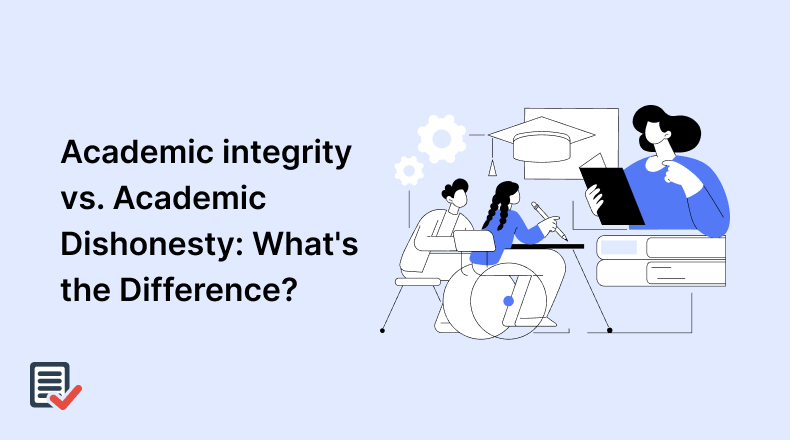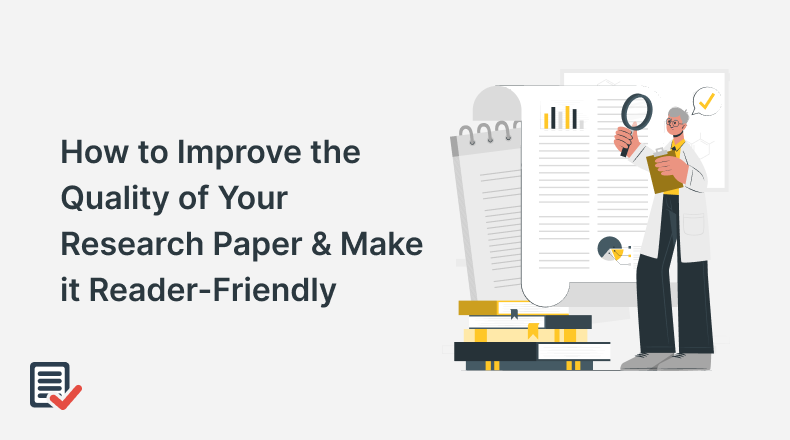
Whether you are a student or educator or work in an institution, “Academic Integrity” and “Academic Dishonesty” are two terms that you must have noticed in most educational institutes. They are used to construct the students to avoid any form of plagiarism and keep their writing authentic and credible.
Now you must be wondering, why does it matter, right?
Academic integrity matters because it upholds the values of honesty, fairness, and respect in education. In this article, we have explored the essential aspects of academic integrity, from its definition to practical tips on how to avoid academic dishonesty in your writing.
What is Academic Integrity?
If you want to explain academic integrity in three words, then it means upholding honesty, trust, and responsibility in your academic work. Just think of it as a commitment you make to always submit only original work, with proper citation and no cheating or plagiarism.
Do you know what’s the best part?
Academic integrity not only helps you improve your grades, but it also enhances your credibility and reputation, making you a trustworthy individual.
Academic integrity has a significant impact on every individual, whether you are a student or a professional researcher. For this reason, institutions use policies, honor codes, and tools like plagiarism checkers to promote fairness and support honest work.
What is Academic Dishonesty?
Academic dishonesty refers to dishonest behavior, including cheating, plagiarizing, manipulating data, or submitting others’ work. In short, academic dishonesty includes every type of cheating or dishonest behavior in academia.
Engaging in any kind of dishonest practice can lead students to academic penalties, loss of trust, and damaged reputation. And in the worst cases, they can also get expelled from their institutions. Therefore, no matter what, students must avoid all such practices and ensure academic integrity at all costs.
What is the Difference Between Academic Integrity and Academic Dishonesty?
Academic integrity is all about honesty, responsibility, and fairness in your academic work. Every student or researcher needs to learn the best practices about how they present information, interpret results, and give credit to others. Just think of it this way: a commitment to academic integrity doesn’t just impact your grades; it upholds trust in the whole educational system.
On the other hand, academic dishonesty is any behavior that goes against these values. It can include cheating, lying, or using shortcuts to gain an unfair advantage. Thus, it ultimately leads to misrepresentation of your abilities and efforts. Therefore, you should recognize how academic dishonesty impacts not only you but also others who might rely on your work or collaborate with you.
Tips to Avoid Academic Dishonesty
If you want to make your work credible and authentic, then the first thing you need to avoid is academic dishonesty. For this, you can follow effective writing strategies to ensure academic integrity in every task.
Here are some of them you can implement:
1. Understand Your Institution’s Policies
It is important to know your school’s specific rules about citations, referencing, and collaboration. Many schools have handbooks or guidelines that clarify academic integrity standards.
2. Use a Plagiarism Checker
A plagiarism checker can help you identify accidental copying or missing citations. Therefore, whenever you write something, just pass it through a reliable tool to ensure originality and prevent unintentional errors in your writing.
3. Cite Sources Properly
You should always provide accurate citations for ideas, quotes, or data that you copy from others. So, even when you paraphrase something, try to cite every resource included to avoid any possible chance of plagiarism.
4. Manage Your Time Effectively
Poor time management often leads to shortcuts. So, always plan your assignments in advance to avoid last-minute stress, which can push you towards dishonest actions.
5. Avoid Unauthorized Collaboration
Many institutions expect individual work for specific assignments. So, avoid sharing your answers or working with others unless explicitly allowed by your instructor.
6. Ask for Clarification
You should reach out to your instructors if you feel uncertain about the citation rules or assignment instructions. Asking questions can help you prevent misunderstandings that lead to unintentional dishonesty.
Conclusion:
What happens if you commit academic dishonesty? The consequences vary, but remember that each one can affect your academic and professional career. Institutions typically record major offenses, and these records can follow you into your career. Whether you’re aiming to be a doctor, researcher, or teacher, your reputation depends on maintaining trust and integrity.







